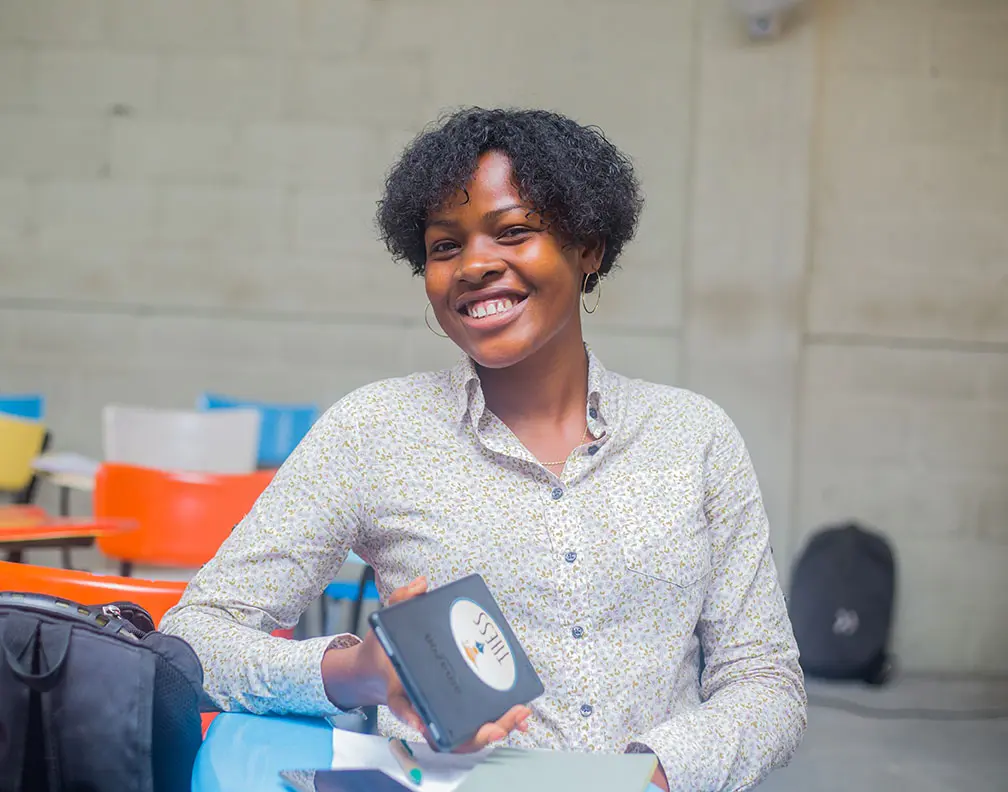Waina, the Young Woman Who Discovered “Another” Internet through an Ayitic Course
08/03/2019

Waina Moise is a young Haitian woman who works informally selling clothes. Waina wanted to increase her income, an extremely difficult challenge in the context of the Haitian economy. Yet the idea of using the Internet to do so had never occurred to her until she had the chance to participate in the first round of digital skills training for Haitian women offered through the Ayitic project, an initiative promoted by LACNIC and the International Development Research Center of Canada (IDRC).
During that experience, Waina and 50 other Haitian women aged 18 to 29 received 13 weeks of training on the use of online tools, Internet security and data management at ESIH, the higher school of infotroniques of Haiti, which serves as primary local partner and is in charge of hosting and coaching students. Course contents were developed by the Caribbean Open Institute.
This course was part of the Ayitic training program, and its goal was to create conditions to increase the access of young Haitian women to the digital employment market. Waina and her classmates continue to receive support from Ayitic through the program’s Employability Coordinator, sociologist Alda Berardinelli, to help them join the job market in the digital economy. Between 2018 and 2019, the plan is to train 300 young women through online courses.
“What surprised me the most is learning that I can work from home and earn money. Now I understand that, using technology, I can sell over the Internet,” Waina told us from Haiti.
What did it mean for you to be selected to participate in Ayitic’s training program for women?
I am grateful to Ayitic Goes Global for designing the program to empower young Haitian women, teaching us different skills and showing us how to find work online. The course and the learning experience were very useful and innovative. In Haiti, we normally do not use this training methodology with the support of mentors. The tutorials and group sessions were original and very practical. The atmosphere was very good and kept me motivated. I feel that I am fortunate to have participated in this training course, as many women expressed their interest in doing so.
What does this training course mean to you as a woman?
I have already benefited simply by participating. As a woman, I am proud to have had this new experience. The initiative is interesting and well-designed. The contents of the course itself are very new in Haiti, as the courses offered here to women typically teach them secretariat skills. In Haiti, ICTs usually focus on men. Now we can also be part of this area of specialization.
I will continue to participate in similar training activities to be better prepared for the job market. As women, we may face difficulties and we may not receive same salary, but it is not impossible.
What do you feel you learned during the course? How do you apply this in your daily life and in the search for employment opportunities?
During the course I learned new concepts which I found very interesting, such as the definition of the Internet, how the Internet works, the services, the advantages of using the Internet, data management, the most important aspects of online security (how to create secure passwords) and many other topics. Before the course I had some basic knowledge, but I learned to make better use of the Internet and to have a better online experience. As for employment, I am now familiar with job marketplace platforms such as Fiverr, Freelancer and Upwork, and I have created accounts that I use to look for work.
Did you have any knowledge of technology and digital tools before learning these skills through the Ayitic course?
Yes, I did have some basic knowledge. At school I learned how to use a keyboard and how to enter data in Excel. However, this course taught me to better manage the data.
How are you working with the employability coordinator in your search for job opportunities?
We meet with the employment coordinator in Banj, a Haitian co-working space, and work on searching for online jobs. We have also organized workshops to set the rules and principles that will guide us when we find work online: how we will distribute the tasks, how we will work, how we will distribute our earnings, criteria, responsibilities, etc. When there are things we need to review, we organize an activity to refresh our knowledge.
What are your perspectives for the future considering the tools and skills you learned in the course?
What surprised me the most is learning that I can work from home and earn money. Now I also understand that, using technology, I can sell over the Internet. For example, I used to sell clothes to my friends, but I didn’t know how to optimize my sales. I spent hours looking at photos or artists without realizing the opportunities I had. Now I make a better use of the tools I have, and I’ve created professional pages to sell clothes and bags. From a social point of view, helping people develop their leadership skills has always been my desire and I founded a non-profit association to share my knowledge and seek opportunities for others too.
The course helped me understand how online platforms can be useful for selling clothes and accessories. Before the course I knew that platforms such as Amazon existed, but I didn’t understand their importance. I was selling clothes, but I was not marketing them online. Now, I use platforms like Instagram to upload my product photos. I also created a name for my business: Sunshine Fashion Style.
(Free access, no subscription required)